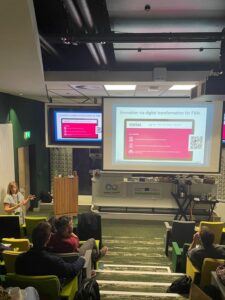 Exploring Digital Solutions for Food Waste: DIGIFABS Presented at Regional Stakeholder Meeting
Exploring Digital Solutions for Food Waste: DIGIFABS Presented at Regional Stakeholder Meeting
In June, Paula Whyte from Momentum had the pleasure of speaking at a Food & Beverage Regional Stakeholder Meeting held at the BIA Innovator Campus in Galway – a fellow partner in the Erasmus+ DIGIFABS project. The event focused on one of the most pressing issues in the food & beverage sector today: food waste.
With more than 20 engaged participants from across the region – including representatives from Galway County Council, the Galway Climate Action Team, Atlantic Technological University (ATU), the University of Galway, waste management bodies, food system innovators, and local SMEs – the session provided a powerful platform to explore how we can collaboratively reduce food waste through smarter strategies and shared learning.
The Importance of Education & Awareness
A key theme that emerged from our discussions was the critical role of education and awareness creation in addressing food waste. From primary schools to universities to SME upskilling, participants echoed the need for more integrated, meaningful education across all levels.
As part of the session, Paula introduced the DIGIFABS project, which explores how, through education, digital tools and innovative technologies can be harnessed to tackle sustainability challenges – including in reducing food waste within the food & beverage sector.
Tech-Enabled Circular Thinking
Attendees reflected on current and growing SME practices – such as the repurposing of surplus or imperfect ingredients – which provide an ideal entry point for embedding food systems thinking into everyday operations and learning. There is a growing need for small producers and F&B SMEs to optimise these practices using digital tools – from inventory tracking systems that flag surplus in real time, to IoT sensors that monitor shelf life, and data dashboards that help forecast demand and minimise overproduction.
These technologies empower SMEs to make smarter, faster decisions about what can be salvaged and transformed into value-added products like soups, sauces, or baked goods. Showcasing this kind of tech-enabled circular thinking offers powerful, real-world examples of how innovation and sustainability can go hand-in-hand.
The DIGIFABS project aims to strengthen digital readiness and resilience by equipping learners and stakeholders with the skills to use tools like IoT, data dashboards, 3D printing, and more to enhance business operations, including reducing waste across the food value chain. This aligned perfectly with the discussions on the day.
A Fitting Venue for Innovation
The fact that the event was hosted at the BIA Innovator Campus, a DIGIFABS project partner, made the introduction even more relevant. BIA’s mission to foster innovation and support regional SMEs mirrors DIGIFABS’ goals – bridging traditional food practices with cutting-edge digital approaches.
Looking Ahead: Building Momentum for DIGIFABS
It was inspiring to see such strong engagement from regional stakeholders, many of whom expressed a clear interest in the DIGIFABS project and its potential applications. Attendees were particularly curious about how digital tools could be integrated into their own operations or educational programmes – whether through pilot initiatives, bootcamps, or business-led experimentation. The conversations reflected a growing appetite for innovation and a shared recognition that digital solutions can play a pivotal role in tackling sustainability issues.
Looking ahead, this event served as an excellent opportunity to promote the DIGIFABS project, build awareness, and generate interest in its resources among key regional players. The enthusiasm and positive feedback set a strong foundation for further collaboration, increased resource uptake, and broader project impact.
We’re excited to continue building on this momentum as DIGIFABS evolves – empowering food educators and innovators with the skills and tools needed to drive smarter, more sustainable practices across the sector.
